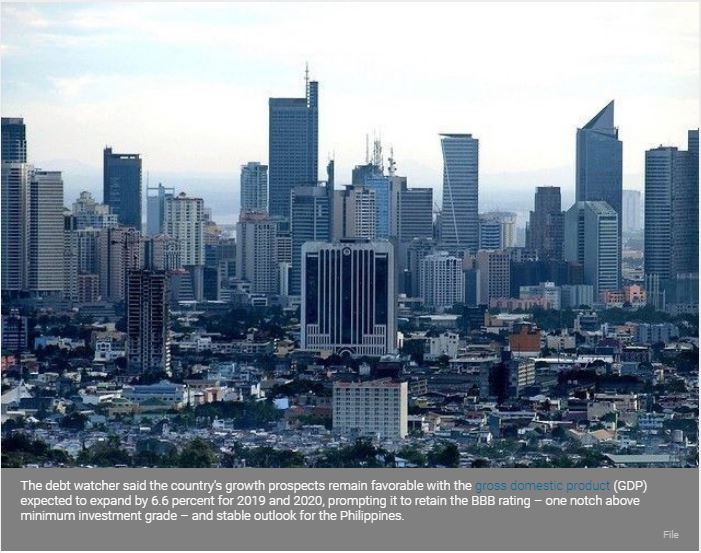Fitch reaffirms Philippines investment grade, flags overheating risks
MANILA, Philippines — Fitch Ratings yesterday cautioned the Philippines about overheating risks, including strong credit growth and wider current account shortfall, as it reaffirmed the country’s investment grade credit rating.
The debt watcher said the country’s growth prospects remain favorable with the gross domestic product (GDP) expected to expand by 6.6 percent for 2019 and 2020, prompting it to retain the BBB rating – one notch above minimum investment grade – and stable outlook for the Philippines.
“However, Fitch believes that overheating risks remain in place, highlighted by rapid credit growth and a widening current-account deficit, although the central bank’s stated intention is to remain vigilant against developments that could affect the inflation outlook,” it said.
Bangko Sentral ng Pilipinas Governor Nestor Espenilla Jr. said the favorable growth projection by Fitch for the economy is consistent with that of the central bank.
“We expect growth to remain solid in the years ahead, owing in part to the BSP’s commitment to price and financial stability, which provides an enabling environment for businesses to thrive and for consumers to keep their purchasing power intact. We will continue to complement the government’s development efforts through conduct of sound and proactive monetary policy and financial supervision,” Espenilla said.
Espenilla said the latest inflation forecast points to within-target inflation in 2019 and 2020 following the successive monetary policy increases done by the Monetary Board this year.
“The elevated inflation in 2018 was mainly driven by supply-side factors that are beyond the control of monetary policy, but we acted pre-emptively to address any brewing demand-side pressures and potential second-round effects ahead. This proactive move will help ensure that inflation settles within target, at least over the next two years,” Espenilla said.
The debt watcher said inflation is likely to go back to within the BSP’s target level of two to four percent by 2019 after being elevated in 2018.
“Fitch recognized the effectiveness of the successive rate hikes implemented by the BSP and the measures done by the national government to ease constraints to rice supply,” the rating agency said.
BSP Deputy Governor Diwa Guinigundo said the economy is not facing any material threat of overheating.
While credit is growing, Guinigundo pointed out the pace of increase is within levels considered manageable based not only on the BSP’s own metrics but even on international benchmarks.
“Additionally, credit growth in the country is driven not only by consumption, but more importantly by investment activities which boost the economy’s productive capacity. As such, we see growth in demand continually and sufficiently being matched by rising supply, thereby continuing to dampen demand-side inflationary pressures moving forward,” Guinigundo said.
Finance Secretary Carlos Dominguez III said Fitch’s forecast of strong growth in the years ahead affirms the soundness of the Duterte administration’s economic development strategy, which is to sustain high growth, accelerate poverty reduction, and achieve financial inclusion by way of unmatched investments in infrastructure modernization and human capital development without losing its grip on fiscal discipline.”Dominguez added the first package of the comprehensive tax reform program under Republic Act 10963 or the Tax Reform for Acceleration and Inclusion (TRAIN) Law that has already delivered in terms of raising more revenues to fund the government’s priority programs, along with the rest of the tax reforms that we hope the Congress can pass in 2019 would put in place a simplified tax system benefiting ordinary taxpayers and small businesses while being supportive of our medium- and long-term goals for the Philippines to become an upper-middle income economy by 2022 and a high-income one by 2040.
Source: https://www.philstar.com/business/2018/12/21/1878642/fitch-reaffirms-philippines-investment-grade-flags-overheating-risks#X2EuEJrlQME4Lore.99


 English
English




